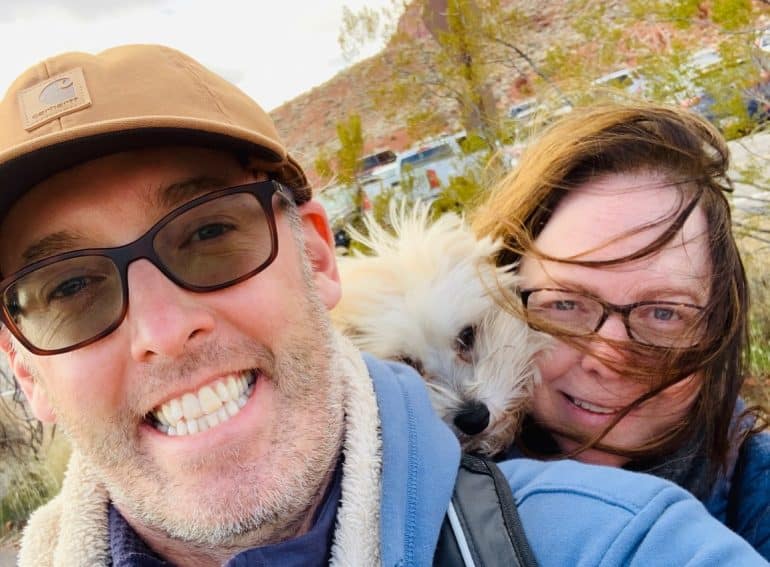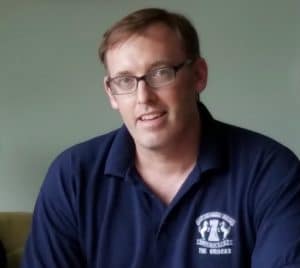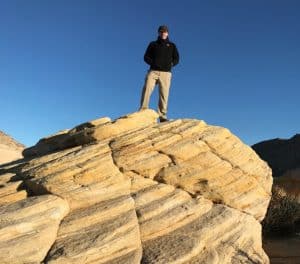
Simon Dyton went on to become a School Captain under Eamonn Harris and then to gain a Double First and a PhD studying English and History at Cambridge – but his first encounter with QE’s then-Headmaster was far from auspicious.
“He largely ignored me and spoke to my parents,” says Simon (OE 1997–1994; School Captain 1993). “My father said, ‘Why don’t you talk to Simon?’ Mr Harris said to him sternly: ‘I can fix a naughty boy, but I cannot fix a naughty parent.’”
 Later, however, Simon learned lessons both from Mr Harris and from other QE teachers that have stood him in good stead for his current role as an English teacher in the Upper School at the Marymount School of New York, a nursery-to-high school for girls on Fifth Avenue.
Later, however, Simon learned lessons both from Mr Harris and from other QE teachers that have stood him in good stead for his current role as an English teacher in the Upper School at the Marymount School of New York, a nursery-to-high school for girls on Fifth Avenue.
“The students at Marymount recently voted to have me speak to my school’s National Honor Society and share some scholarly advice. I was immediately reminded of a lesson I learned from Eamonn Harris. He once told me that the most important thing in life was ‘kissing the plan’, by which he meant that ‘doing a little bit’ every day was the best way to get a job done. That has stuck with me.
“I never thought that I’d be using my experiences of English lessons at QE to design my own classes, but the experiences of being taught by Mr [Eric] Houston and Mr [David] Jones proved very useful.
“Mr Cossey was also a fantastic example of passionate teaching. His furious roaring (and slamming of desks) over Harold II’s anger at William the Conqueror stayed with me for years. I love sharing my enthusiasm for storytelling and my enjoyment of language and literature with my students.”
“I remember Mr Houston making a boy stand against a wall in the Science block for ‘not behaving like a good chap’. This is when I started to sense that the school was being hoisted up by its socks into a new kind of institution. I loved the school trips to Moscow and St. Petersburg with Mr [Tom] Guthrie. I met my first Russian gangsters, held my first handgun, and — in a more trusting age of air travel — sat in the cockpit and lowered the landing-gear when we landed back in England.
“I loved being School Captain: organising Founder’s Day was a fantastic challenge.”
After A-levels, Simon took up a place at Gonville and Caius College. “When I went up to Cambridge, my main model for life at university was The Young Ones television show. I had been looking forward to learning alongside girls for the first time, but Caius didn’t admit any female students to read English that year, so I was stuck with more boys. I played rugby and rowed.”
Following his graduation, he stayed on at Caius for an MPhil and a PhD. “My doctorate involved exploring representations of early modern religious radicalism and grew out of a love of John Milton, whose Paradise Lost I first read in A-level English with Mr Houston.”
In those post-graduate years, he recalls enjoying lunch and drinks with Eamonn Harris in The Eagle, the 17th-century Cambridge pub where, in 1953, James Watson and Francis Crick famously first spoke of their discovery of the structure of DNA. “He was excellent company and was really enjoying retirement.”
Simon served as the MCR [Middle Combination Room] President and introduced graduate seminars that continued, in one shape or another, for years. “I loved my time at Gonville and Caius College. I made some excellent friends, and friendships have been the source of memories that I value the most.
“As a graduate student, I really enjoyed teaching undergraduates, but I loved working with teenagers on summer schools—first on a Cambridge University outreach scheme and then for a New York-based company that operated academic summer schools all over Europe. After several years, I visited New York to work for that company on a short-term work visa, which ultimately turned into a Green Card, by which time I was running summer schools and hiring teachers from all over the world to teach everything from Anthropology to Zoology—mostly in Oxford and Cambridge.
“Eventually, I decided that I wanted to teach full-time, so I looked into teaching and joined the Marymount School here in New York. I’ve had no real masterplan or strategy behind my career path. I’ve always enjoyed studying, writing, coaching, and teaching. I am a long-time believer in reading widely, thinking broadly, and finding the happiness in life. I’ve pursued a career that I enjoy and that I find satisfying.”
Among the many highlights of this career, he recalls one recent, somewhat “terrifying”, example: “The students voted for me to take half-court shots during the high school’s Spirit Week pep rally. (Spirit Week, by the way, is a week of morale-boosting activities designed to help the students through the post-Christmas gloom.) I think it was Mr [David] Maughan and Mr Clarke who coached basketball, but nothing prepared me for hundreds of students chanting, ‘Dr. D, Dr. D!'”
 Another highlight of his life stateside recurs daily as he savours his walk home each day across Central Park.
Another highlight of his life stateside recurs daily as he savours his walk home each day across Central Park.
“When I arrived in New York, I was told that it was a great place to spend some of my 20s (I was 28) and all of my money, but—now that I’m in my 40s—I’ve found a happy place on the Upper West Side with my wife, Meredith, and dog. I feel very fortunate that I can live and teach in a city that’s incredibly diverse. I recall that I did a project on Kyrgyzstan for Mr Guthrie in A-level Russian, but it’s only in New York that I finally met a Kyrgyz horseman, who was stunt-riding for the circus. You never know who you’ll meet, and everyone has an interesting story.”
He is now a US citizen. “My wife and I spend our vacations in the deserts of southern Utah, on the beaches of the Virginia coast, and in the forests of upstate New York. I appreciate hard work, good fortune, personal wellness, and physical fitness.”
